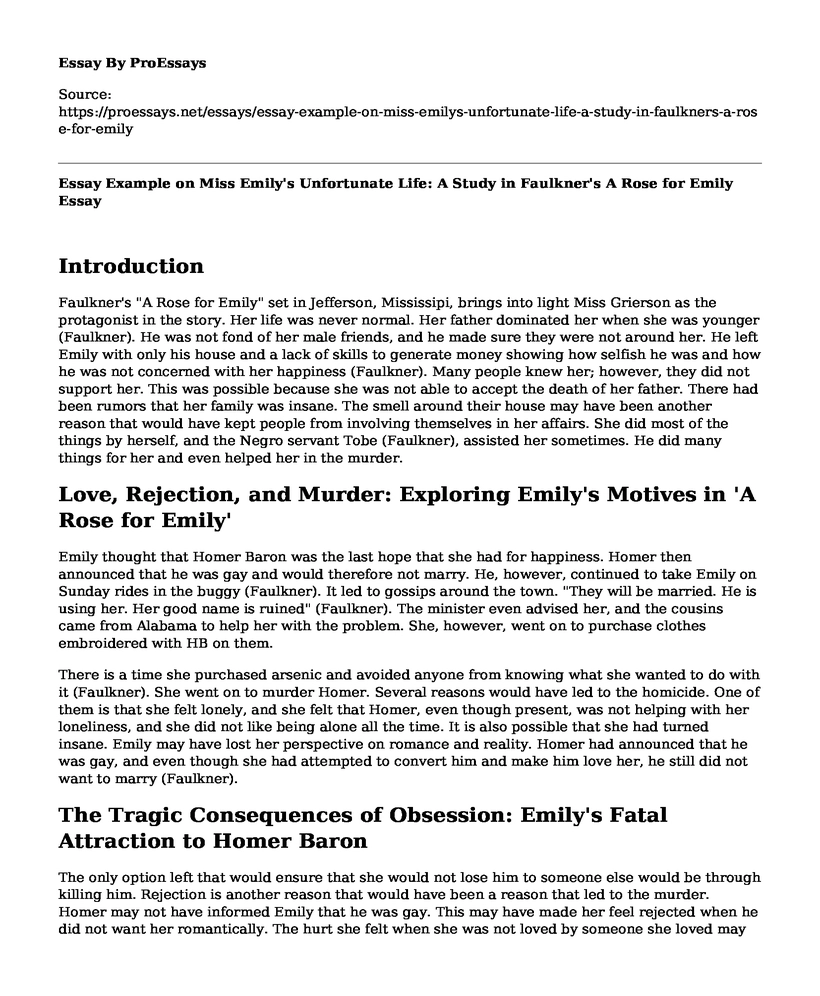Introduction
Faulkner's "A Rose for Emily" set in Jefferson, Mississipi, brings into light Miss Grierson as the protagonist in the story. Her life was never normal. Her father dominated her when she was younger (Faulkner). He was not fond of her male friends, and he made sure they were not around her. He left Emily with only his house and a lack of skills to generate money showing how selfish he was and how he was not concerned with her happiness (Faulkner). Many people knew her; however, they did not support her. This was possible because she was not able to accept the death of her father. There had been rumors that her family was insane. The smell around their house may have been another reason that would have kept people from involving themselves in her affairs. She did most of the things by herself, and the Negro servant Tobe (Faulkner), assisted her sometimes. He did many things for her and even helped her in the murder.
Love, Rejection, and Murder: Exploring Emily's Motives in 'A Rose for Emily'
Emily thought that Homer Baron was the last hope that she had for happiness. Homer then announced that he was gay and would therefore not marry. He, however, continued to take Emily on Sunday rides in the buggy (Faulkner). It led to gossips around the town. "They will be married. He is using her. Her good name is ruined" (Faulkner). The minister even advised her, and the cousins came from Alabama to help her with the problem. She, however, went on to purchase clothes embroidered with HB on them.
There is a time she purchased arsenic and avoided anyone from knowing what she wanted to do with it (Faulkner). She went on to murder Homer. Several reasons would have led to the homicide. One of them is that she felt lonely, and she felt that Homer, even though present, was not helping with her loneliness, and she did not like being alone all the time. It is also possible that she had turned insane. Emily may have lost her perspective on romance and reality. Homer had announced that he was gay, and even though she had attempted to convert him and make him love her, he still did not want to marry (Faulkner).
The Tragic Consequences of Obsession: Emily's Fatal Attraction to Homer Baron
The only option left that would ensure that she would not lose him to someone else would be through killing him. Rejection is another reason that would have been a reason that led to the murder. Homer may not have informed Emily that he was gay. This may have made her feel rejected when he did not want her romantically. The hurt she felt when she was not loved by someone she loved may have led to the murder. Emily was angry about what was happening around her. She had spent a lot of time with Homer. Homer had even taken her to ride in her buggy and promised to stay with her in Jefferson (Faulkner). He, however, wanted to leave, and she felt that it was not fair for her, and felt angry to the point of murdering him. Her life was always seen her be under her father's service. She may have felt that it was now time to get what she wanted from a man, and the only way was through getting Homer for himself. This was however not possible, and she felt provoked and ended up killing Homer.
Work Cited
Faulkner, William. A rose for Emily. Paderborn, De: Verlag F. Schoningh, 1958.
Cite this page
Essay Example on Miss Emily's Unfortunate Life: A Study in Faulkner's A Rose for Emily. (2023, May 03). Retrieved from https://proessays.net/essays/essay-example-on-miss-emilys-unfortunate-life-a-study-in-faulkners-a-rose-for-emily
If you are the original author of this essay and no longer wish to have it published on the ProEssays website, please click below to request its removal:
- Compare and Contrast Essay the Odyssey vs the Inferno
- Essay Sample - Love is Equal to Cholera as Written by Gabriel Garcia Marquez
- The Duality of a Man with Enron and the Lord of Flies: Paper Example
- Critical Essay on Frank Kafka's Metamorphosis
- Critical Essay on Hamlet Play by Shakespeare
- Essay Example on Romance and Revolution: A Journey of Self-Discovery in 'As You Like It'
- Essay Sample on Exploring Marxist Theory in William Shakespeare's Othello







